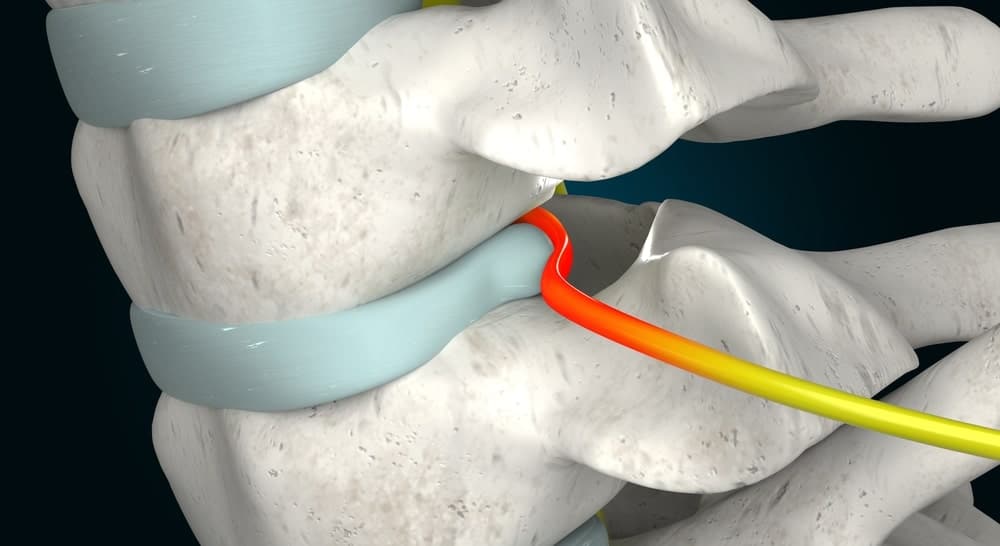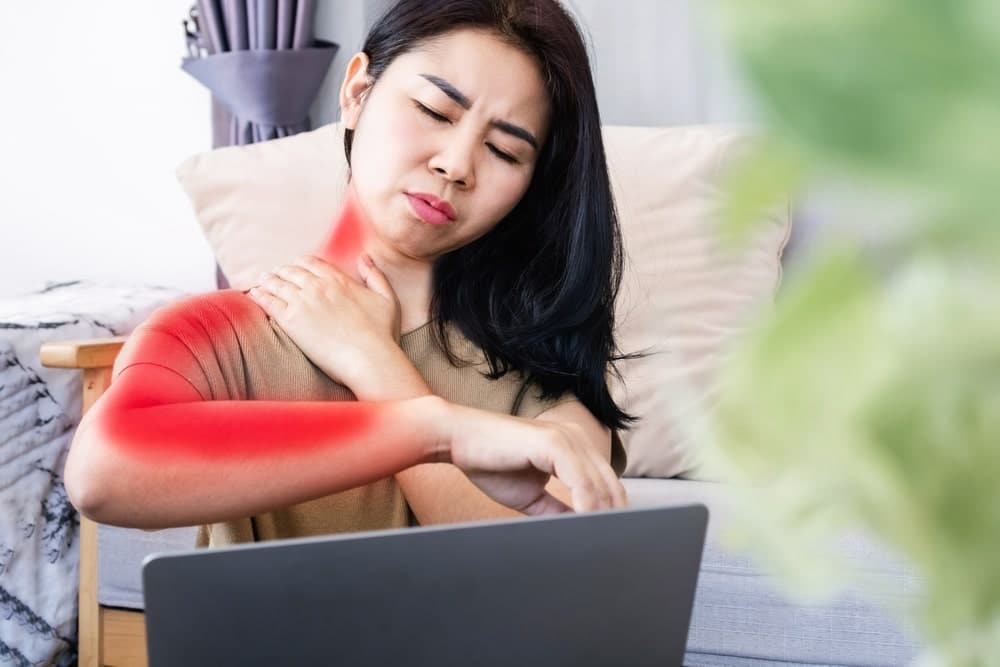Our bodies are complex systems of nerves, muscles, and bones working together to keep us moving and functioning. However, when something disrupts this delicate balance, such as a pinched nerve, it can lead to discomfort and pain. Nerve compression occurs when excessive pressure is applied to a nerve by surrounding tissues, such as muscles, tendons, or bone growths. An experienced and trained chiropractor can help diagnose your condition and treat it in a non-invasive and holistic manner.
How to Tell If You Have a Pinched Nerve
These are the five common signs that may indicate you have cervical radiculopathy (pinched nerve):
Pain or Discomfort
Pain is the most noticeable symptom of a pinched nerve and often helps with early diagnosis. It can vary widely in intensity, from a dull ache to sharp, shooting, burning pain. The discomfort typically occurs along the path of the affected nerve because of blocked electrical impulses. Nerve entrapment pain is often exacerbated by certain movements or positions, making it important to identify the underlying cause. In many cases, it may be prudent to avoid NSAIDs (nonsteroidal anti-inflammatory drugs) for treating pain in spinal discs or soft tissues as they could have side effects.
Numbness or Tingling
Another sign of a pinched nerve is numbness, tingling, or burning sensations, often described as “pins and needles.” When you experience pinched nerves because of excess weight, you may feel pain in various parts of the body. These sensations can occur in the area served by the affected nerve. For example, if the pinched nerve root is in your neck or upper middle back, you might experience numbness or tingling in your arm, hand, or fingers requiring a wrist splint.
Muscle Weakness
When a nerve is pinched, the signals it sends to muscles can become disrupted. This disruption can lead to muscle weakness in the areas connected to the affected nerve. For instance, if you have a compressed nerve in your lower back, you may notice weakness in your leg muscles. This can affect your ability to perform tasks that require strength and coordination. Pinched nerves are most common in the median nerve and could lead to carpal tunnel syndrome.
Radiating Pain
Most pinched nerves cause pain that radiates from the site of compression to the surrounding tissue and other parts of the body. The pattern of radiating pain can provide valuable clues about which nerve is affected. For instance, when pinched nerves originate in the lower back, they may result in sciatica, a condition characterized by pain that travels down the leg. Lumbar radiculopathy, in which the nerve roots get inflamed, results in severe pain while performing repetitive motions involving the spinal cord.
Symptoms Worsen with Movement
Symptoms of this condition worsen when you engage in certain movements or positions. For example, if you have a stiff neck because you did not get the pinched nerve treated, tilting your head or engaging in the wrong stretching exercises may increase your pain or discomfort. Conversely, resting or changing your posture may relieve pain and other symptoms. Recognizing the movements or positions that exacerbate common symptoms can be helpful in managing and addressing the condition.
You should have your pinched nerve diagnosed immediately to prevent permanent nerve damage. Ignoring the symptoms of a pinched nerve can lead to worsening discomfort and potential complications, including spinal nerve problems, bone spurs, or a herniated disc.
Why Consult a Chiropractor in Miami for a Pinched Nerve?
Chiropractors are highly trained healthcare professionals who specialize in diagnosing and treating musculoskeletal conditions, including compressed nerves. In fact, chiropractic care and physical therapy are the most frequently recommended treatments for issues with the spinal canal and nerve pathways.
- Accurate Diagnosis: Chiropractors have experience assessing the musculoskeletal system. They can perform thorough evaluations to pinpoint the exact location of the pinched nerve and determine its underlying cause.
- Non-Invasive Treatment: Chiropractic care offers non-invasive, drug-free treatment options for pinched nerves. Chiropractors use gentle techniques like cervical spine adjustments to relieve pressure on the nerve and restore proper nerve function. It is a frequently recommended treatment for nerve compression, neck pain, improving nerve function, and other neurological disorders.
- Personalized Care: Chiropractors create individualized treatment plans to address specific needs and symptoms. They consider your overall health and work with you to develop a plan that supports your recovery and reduces chronic pain.
- Preventive Measures: Chiropractors not only treat existing compressed nerves but also provide guidance on preventive measures to avoid future issues. They may recommend exercises, stretches, and lifestyle adjustments to reduce the risk of recurrence.
- Holistic Wellness: Chiropractors focus on improving overall well-being and not just treating symptoms. They emphasize the importance of a healthy lumbar spine and nervous system in maintaining optimal health.
- Improved Posture: Poor posture can lead to a range of health problems, including back and neck pain. Chiropractors can assess your posture and provide guidance on improving it, which can have a positive impact on your overall health.
Do Pinched Nerves Go Away on Their Own?
In some cases, mild pinched nerves may improve over time as the underlying cause of the compression resolves. However, many types of nerve entrapment are caused by structural issues, such as misaligned vertebrae or herniated discs, which are less likely to resolve without intervention. Additionally, the longer a pinched nerve persists, the greater the risk of developing chronic symptoms and complications.

How Do You Relieve a Pinched Nerve?
If you suspect you have a pinched nerve or are experiencing symptoms such as pain, numbness, or tingling, you should seek professional chiropractic care for a comprehensive assessment and personalized treatment plan.
- Comprehensive Assessment: The first step is to perform a thorough assessment to determine the cause and location of the pinched nerve. This may involve a detailed medical history review, a physical examination, and diagnostic tests like X-rays or Magnetic Resonance Imaging scans. Identifying the underlying issue is essential for effective treatment.
- Chiropractic Adjustments: Chiropractic adjustments, also known as spinal manipulations, are a cornerstone of pinched nerve relief. By applying gentle and precise force to specific areas of the spine, they can alleviate pressure on the affected nerve and restore proper spinal alignment. These adjustments can often provide immediate relief from pain and discomfort.
- Soft Tissue Therapy: In addition to spinal adjustments, chiropractors may use soft tissue therapies such as massage, myofascial release, or trigger point therapy to relax tight muscles and reduce tension around the pinched nerve. This can enhance the effectiveness of chiropractic adjustments.
- Stretching and Exercises: Chiropractors often prescribe specific stretches and exercises to patients to help improve flexibility, strengthen supportive muscles, and reduce the risk of future pinched nerves. These exercises are created to match your individual needs and may be an essential part of your recovery plan.
- Lifestyle and Ergonomic Advice: Your daily activities and posture can contribute to nerve impingement. Chiropractors provide guidance on ergonomics, proper body mechanics, and lifestyle adjustments to minimize stress on nerves and prevent reoccurrence.
- Nutrition and Hydration: A balanced diet and proper hydration play a role in nerve health. Chiropractors may offer nutritional advice to support your body’s natural healing processes and reduce inflammation.
- Heat and Cold Therapy: Applying hot or cold packs to the affected area can help reduce inflammation and alleviate pain associated with pinched nerves. Chiropractors can recommend the appropriate application based on your condition.
- Rest and Recovery: Adequate rest and allowing your body time to heal is necessary. Chiropractors may recommend modifications to your daily activities or provide ergonomic aids to support your recovery.
- Ongoing Care: Depending on the severity of your condition, ongoing chiropractic care may be recommended to ensure that the cervical radiculopathy heals correctly. Regular check-ups can help monitor your progress and adjust treatment as needed.
Chiropractic care is a non-invasive and drug-free approach to pinched nerve relief. It focuses on helping your body heal naturally without the need for surgery or medication, such as anti-inflammatory drugs.

Can You Unpinch a Pinched Nerve?
Chiropractic care, along with various other conservative treatments, can often help relieve the compression or symptoms associated with a pinched nerve.
- Spinal Manipulations: Chiropractors use precise spinal adjustments to realign the vertebrae and reduce pressure on the nerve. These adjustments aim to restore proper spinal alignment, which can alleviate the compression causing the pinched nerve.
- Reducing Inflammation: Chiropractic care may include soft tissue therapies like massage or trigger point therapy, which can help relax tight muscles and reduce inflammation around the pinched nerve. Reducing inflammation can relieve pressure on the nerve and promote healing.
- Strengthening Supportive Muscles: Chiropractors often prescribe specific exercises and stretches to strengthen the muscles that support the affected area. By improving muscle strength and flexibility, you can reduce stress on the nerve and prevent future nerve compression issues.
Consult with Our Compassionate and Wellness-Focused Chiropractors to Enjoy a Pain-Free Life
The skilled therapeutic chiropractors at SnapCrack are dedicated to helping patients on their path to recovery. Our trained chiropractors can effectively address the underlying causes of your pain, reduce your discomfort, and improve your overall well-being with safe and proven treatments. Schedule an appointment today by using our online form or chatbot.

